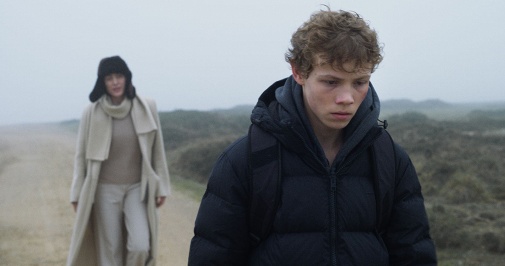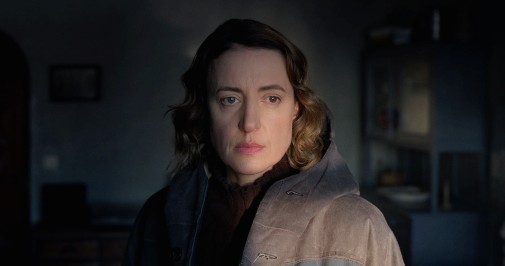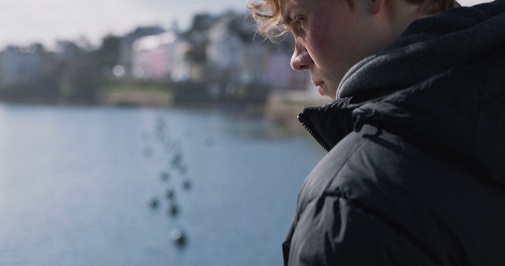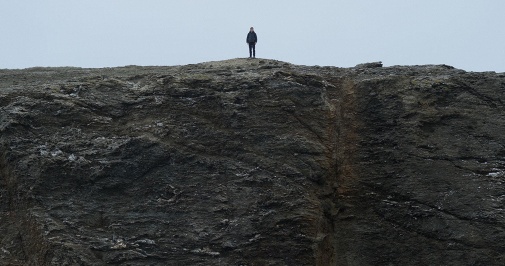
It's always curious how shared themes and repeated motifs can spread through a film festival's program. At TIFF '23, motherhood is among the hottest topics, especially concerning the bonds and barriers between single mothers and their adolescent sons. Another more unexpected trend is how many titles enjoying their North American or World Premieres recall Todd Field's TÁR, as if that work had echoed a shape-shift sound through the art film scene. None of this means cineastes are copying each other or that festival programmers are indulging in redundancy. It's merely a thought-provoking coincidence that can lead the viewer down the road to comparison and offer new avenues of analysis. Amid the similarities, you may grow to treasure each project's specificity, their points of divergence.
Consider Hanna Antonina Wojcik-Slak's Not a Word, where a busy orchestra conductor raising her son alone is confronted with the boy's inherent unknowability…

Disconnection abounds inside a posh Berlin apartment, all silver and minimalism, high-end clean surfaces that beget cold elegance more than the warmth of home. As shot by Claire Mathon, the space is often rendered in shallow focus, as if its inhabitants were distanced from their surroundings as much as they are psychologically apart. Here live Nina Palcek and her teenage son Lars. Currently, the conductor is preparing a concert of Mahler's Fifth Symphony to be played at the Philharmonic while the boy keeps to his room, sullen, communicating via a drone camera and speaker that buzzes through the home.
Driving to school, the invisible wall between mother and son becomes ever more noticeable, especially when we glimpse a makeshift memorial at the gate. A student has died, presumably by violent means, and Nina has nothing to say. In another actor's hands, the maternal failures presented as part of a career woman's personality could be read as misogynistic. However, Maren Eggert, who you might know from I'm Your Man, brings enough specificity to her faraway demeanor so that the broken bond with Lars isn't born out of simple neglect. It reveals a multi-pronged issue, Nina's musical ambition a smokescreen, maybe a misdirection.
Moreover, Jona Levin plays the boy like a riddle wrapped in a mystery inside an enigma. It's not a matter of restraint as a conduit for alienation since the actor feels relatively open in his responses. The puzzling problem of Lars is rendered through a decontextualization of those reactions, both as a filmmaking strategy and as the young thespian's keenness. He illuminates the individual dots vividly but doesn't connect them for us, leaving the audience in a similar position as Nina. This is never more evident than when Wokcik-Slak and editor Bettina Böhler intercut between a Mahler rehearsal and Lars' accident at school.

He falls from a window when his mother's working, and cinematic magic leads the woman to score what could be her son's suicide attempt. Reaching the point of irrefutable crisis, her ex-husband unwilling to intervene in any significant way, Nina comes to Lars. Acquiescing to his desires, she agrees to spend a weekend on the barren island of Locmaria, where the family has a vacation house. It's a strange detour, from the city to the wilderness, in the dead of winter when the place is empty, left to frozen desolation. Indeed, by ferry and car, it looks like mother and son are traveling to the ends of the earth.
You'd believe it if someone said they were on the world's edge, where everything becomes nothing. They might fall into oblivion and nobody will notice, devoured by the horizon and the biting wind. Music follows them down the road to nowhere, whether the sound clamoring inside the composer's head or Amélie Legrand's beautiful score. It's sometimes in tune with the classical compositions played at the Philharmonic, sometimes sounding as if the landscape were singing. Specific passages are so evocative within this alchemy of cutting and music that the dialogue goes away. On such occasions, Not a Word embodies its title, a temporary silent movie.
Gradually, those tonalities curdle into something angrier, the dead girl's fate encroaching on Nina's conscience, infecting her perspective on Lars. The movie seizes, breaking its back in search of horror sensibilities, rotting away a mother's love until you're staring at her frightened face. She's terrified by her son. The threat of fire repeats like leitmotiv, dead animals in a dead world predicating the mother's plight into a rhapsody of anxiety where it's hard to listen to reason. Without revealing the film's secrets, let's say the truth is messier than slasher logic, catharsis fleeting and not entirely convincing.

Not everything works in Not a Word, its symbolic portent played with too heavy a hand – an abandoned fishing boat called Lars feels like the sort of literary construct transplant struggling to work when translated to the screen. There's also a frustrating feeling that the 87-minute exercise could do with some judicious cutting, its story perchance more ideal for short duration than feature length. Nevertheless, Mathon's lensing of Locmaria is enough to justify a cinephile's interest, and Hanna Antonina Wojcik-Slak's work overflows with sincerity. Dedicated to the director's mother, Not a Word plays two conversations like parallel melodies, their union a lean elegy with plaintive knell - one is about grief, the other the great unknown a parent may see when they look at their child and see a stranger.